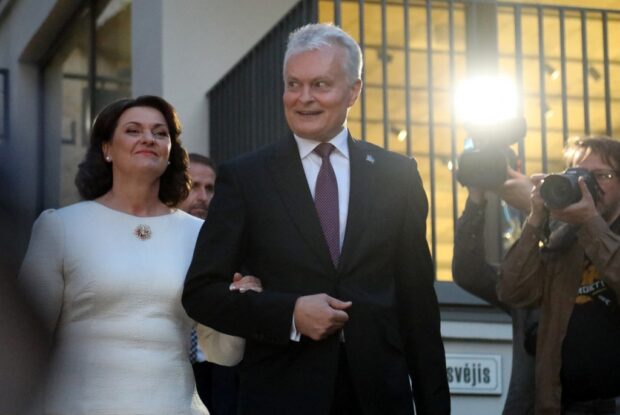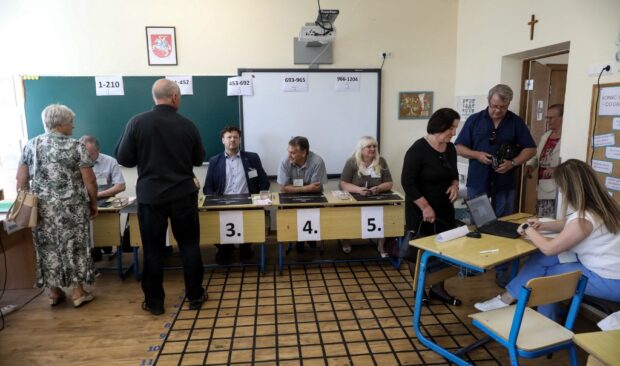Lithuanian president re-elected in vote marked by Russia fears

Lithuania’s President Gitanas Nauseda and his wife Diana Nausediene arrive to wait for the results of the second round of the presidential election on May 26, 2024 in Vilnius, Lithuania. Lithuania’s president and prime minister will face off in the second round of the Baltic state’s presidential vote on May 26, 2024 after the incumbent failed to win an overall majority in the first round on May 12. With almost all the ballots counted in the Baltic state which was once part of the Soviet Union, President Gitanas Nauseda was ahead with 46 percent of the vote while Prime Minister Ingrida Simonyte had 16 percent. (Photo by PETRAS MALUKAS / AFP)
VILNIUS, Lithuania — Lithuania’s President Gitanas Nauseda won re-election on Sunday in a vote marked by defense concerns over neighboring Russia, official results showed.
The count published by the electoral commission showed that Nauseda won 74.6 percent of votes with 90 percent of ballots counted after polls closed in the second-round vote.
READ: Lithuania defends banning Russian, Belarusian observers from election
Voters “have handed me a great mandate of trust and I am well aware that I will have to cherish this,” Nauseda, 60, told journalists in Vilnius.
“Now that I have five years of experience, I believe that I will certainly be able to use this jewel properly, first of all to achieve the goals of welfare for all the people of Lithuania,” he said.
Article continues after this advertisementHis opponent, Prime Minister Ingrida Simonyte, won 23.8 percent of the vote and congratulated Nauseda in comments to reporters.
Article continues after this advertisementThe Lithuanian president steers defense and foreign policy, attending EU and NATO summits, but must consult with the government and parliament on appointing the most senior officials.
While the candidates agree on defense, they share diverging views on Lithuania’s relations with China, which have been strained for years over Taiwan.
Both candidates agree that the NATO and EU member of 2.8 million people should boost defence spending to counter the perceived threat from Russia, and to that end the government recently proposed a tax increase.
“Lithuania’s independence and freedom is like a fragile vessel that we must cherish, protect and prevent from cracking,” Nauseda told journalists late Sunday.
“With the re-election of Gitanas Nauseda, we will see continuity in foreign and security policy, areas where the president will try to remain active,” Rima Urbonaite, a political analyst at Mykolas Romeris university, told AFP.
Fears of war
Vilnius fears it could be next in the crosshairs if Moscow were to win its war against Ukraine.
Lithuania is a significant donor to Ukraine, which has been battling Russia since the 2022 invasion. It is already a big defence spender, with a military budget equal to 2.75 percent of GDP.
It intends to purchase tanks and additional air defense systems, and to host a German brigade, as Berlin plans to complete the stationing of around 5,000 troops by 2027.
Pensioner Ausra Vysniauskiene said she voted for Nauseda.
“He’s an intelligent man, he speaks many languages, he’s educated, he’s a banker,” the 67-year-old told AFP.
“I want men to lead, especially when the threat of war is so big.”

Voters arrive to cast their ballots during the second round of the country’s presidential election at a polling station in Vilnius, Lithuania on May 26, 2024. Lithuania’s president and prime minister will face off in the second round of the Baltic state’s presidential vote on May 26, 2024 after the incumbent failed to win an overall majority in the first round on May 12. (Photo by PETRAS MALUKAS / AFP)
Tension over Taiwan
Simonyte, the 49-year-old candidate of the ruling conservatives, was running for president again after losing to Nauseda in the last presidential ballot.
The uneasy relationship between Nauseda and Simonyte’s conservatives has at times triggered foreign policy debates, most notably on Lithuania’s relations with China.
Bilateral ties turned tense in 2021, when Vilnius allowed Taiwan to open a de facto embassy under the island’s name — a departure from the common diplomatic practice of using the name of the capital Taipei to avoid angering Beijing.
China, which considers self-ruled Taiwan a part of its territory, downgraded diplomatic relations with Vilnius and blocked its exports, leading some Lithuanian politicians to urge a restoration of relations for the sake of the economy.
Nauseda sees the need to change the name of the representative office, while Simonyte pushed back against it.
Gay rights
But voters also cited personal differences between the candidates, as well as economic policy and human rights.
Simonyte drew support from liberal voters in bigger cities and traditional conservative voters.
A fiscal conservative with liberal views on social issues, she notably supports same-sex partnerships, a controversial issue in the predominantly Catholic country.
“I would like to see faster progress, more openness… more tolerance for people who are different from us,” she said when casting an early vote.
Nauseda, who maintains a moderate stance on nearly all issues, has established himself as a promoter of the welfare state, with conservative views on gay rights.